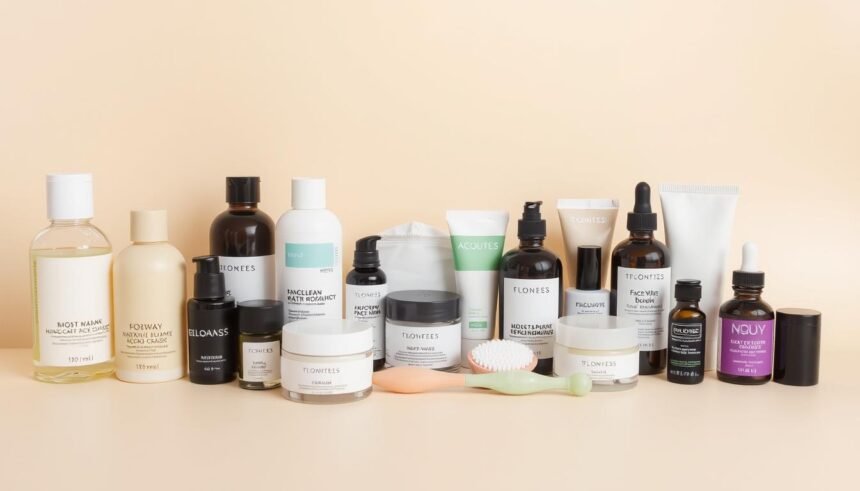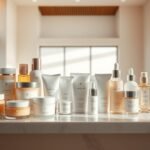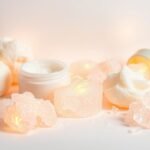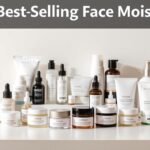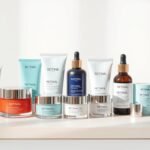Building a good skincare routine doesn’t have to cost a lot. Dermatologist Shilpi Khetarpal, MD, says a great routine fits your skin type and goals. You can get glowing skin with affordable drugstore products.
A good skincare routine does more than just clean your face. It’s about picking the right products for your skin. Whether your skin is dry, has acne, or is sensitive, there are cheap options at your local pharmacy.
Knowing your skin and sticking to a routine is key. By learning about your skin and using the right products, you can change your look and feel more confident. This guide will show you how to make a skincare routine that’s easy on your wallet but still works well.
Key Takeaways
- Personalize your skincare routine to your specific skin type
- Drugstore products can be just as effective as expensive brands
- Consistent facial cleansing is crucial for healthy skin
- Understand your skin’s unique needs and concerns
- Skin moisturizing is essential for maintaining skin health
Understanding the Basics of Skin Types and Care
Figuring out your skin type is key to a good anti-aging plan. Skincare isn’t the same for everyone. Knowing your skin’s needs can change your beauty routine.
Dermatologists say it’s vital to know your skin’s needs. Each skin type needs a special care plan. This helps keep your skin healthy and looking good.
Exploring Skin Type Characteristics
Skin types fall into five main groups:
- Normal Skin: Balanced, with little oil or sensitivity
- Dry Skin: Tends to be flaky and tight
- Oily Skin: Has too much oil, can get acne
- Combination Skin: Oily in the T-zone, dry elsewhere
- Sensitive Skin: Gets easily irritated, needs gentle products
Why Skin Type Matters for Product Selection
Choosing the right skincare products is crucial. The wrong ones can make things worse. They might not work for your skin type.
| Skin Type | Key Characteristics | Recommended Product Types |
| Normal | Balanced, even texture | Lightweight moisturizers, gentle cleansers |
| Dry | Tight, flaky, rough texture | Hydrating serums, cream-based moisturizers |
| Oily | Shiny, enlarged pores | Oil-free cleansers, mattifying products |
| Combination | Mixed skin characteristics | Balancing toners, zone-specific treatments |
| Sensitive | Easily irritated, prone to redness | Fragrance-free, hypoallergenic products |
Common Skin Concerns and Solutions
Each skin type faces its own challenges. There are ways to prevent acne, fight aging, and target specific skin issues.
- Hydration management
- Oil control techniques
- Addressing uneven skin tone
- Minimizing fine lines and wrinkles
Essential Morning Skincare Routine
Starting your day with a good skincare routine is key. It helps your skin stay healthy and glow. The first step is to clean your face well.
A good morning skincare routine has a few important steps:
- Gentle facial cleansing with a mild, non-irritating cleanser
- Applying antioxidant-rich serums
- Skin moisturizing with lightweight hydrating products
- Protecting skin with broad-spectrum sunscreen
Dermatologists say to pick products with natural ingredients. If your skin is sensitive, look for cleansers with chamomile or green tea.
Your morning routine should protect and prepare your skin for the day. Remember:
- Use lukewarm water to keep your skin’s natural oils
- Pat dry your skin instead of rubbing it
- Put on products from lightest to heaviest
Choosing affordable products doesn’t mean they’re not good. Many cheap brands have great skincare. They help clean and moisturize your face well.
Pro tip: Always patch test new products and introduce them gradually into your skincare routine.
Creating an Effective Evening Skincare Routine
Your nighttime skincare routine is key for skin repair. Dermatologists say the evening is best for treating your skin after a long day.
A good evening skincare routine has many steps. It cleanses, treats, and hydrates your skin. It’s important to pick products that help your skin recover while you sleep.
The Double Cleansing Method
Double cleansing is a great way to get your skin ready. It removes all makeup and dirt:
- First, use an oil-based makeup remover.
- Then, use a water-based gentle cleanser.
- Finally, pat your skin dry with a clean towel.
Treatment Products and Serum Application
Serums are very important in your skincare routine. Pick ones that target your skin problems:
- Vitamin C brightens your skin.
- Hyaluronic acid keeps your skin moist.
- Retinol fights wrinkles.
“The right serum can transform your skin overnight,” says Dr. Rachel Nazarian, dermatologist.
Night Moisturizer Selection
Choose a night moisturizer that fits your skin type. Gel moisturizers are good for oily skin. Cream moisturizers are better for dry skin. They help keep your skin hydrated all night.
Being consistent is very important in skincare. Your evening routine helps your skin stay healthy and glow.
Best Drugstore Cleansers for Every Skin Type
Finding the right facial cleanser can change your skincare game without spending a lot. Knowing your skin type is key to picking a cleanser that keeps your skin healthy.
Each skin type needs its own special care. Oily, dry, combination, and sensitive skin all have different needs. Drugstore cleansers can meet these needs.
- Oily Skin: Look for gel-based cleansers with salicylic acid
- Dry Skin: Choose cream or milk cleansers with natural ingredients
- Combination Skin: Opt for balanced, gentle formulations
- Sensitive Skin: Select fragrance-free, hypoallergenic options
Neutrogena Hydro Boost Hydrating Cleansing Gel is great for many skin types. Natural ingredients are important in making good cleansers that care for your skin.
| Skin Type | Recommended Cleanser | Key Benefits |
| Oily | CeraVe Foaming Facial Cleanser | Removes excess oil, non-comedogenic |
| Dry | Cetaphil Gentle Skin Cleanser | Hydrating, minimal irritation |
| Combination | Neutrogena Ultra Gentle Daily Cleanser | Balances skin, versatile formula |
| Sensitive | La Roche-Posay Effaclar Medicated Gel Cleanser | Gentle, dermatologist-recommended |
When looking for facial cleansers, focus on ingredients that fit your skin’s needs. Natural stuff like chamomile, green tea, and aloe vera can help your skin. They also make your skincare routine affordable.
Affordable Toners and Treatments
Toners are key in any good skincare routine. They balance skin pH and remove dirt. They also get your skin ready for more treatments. You can find great toners at drugstores that won’t cost a lot.
Hydrating Toner Options
People with dry or sensitive skin need hydrating toners. These toners add moisture back into your skin. Look for ingredients like:
- Hyaluronic acid
- Glycerin
- Aloe vera
- Ceramides
Exfoliation Techniques with Toners
Exfoliating toners help prevent acne and make skin smoother. The Pixi Glow Tonic is a great choice. It has 5% glycolic acid for gentle exfoliation.
When picking an exfoliating toner, think about:
- Your skin type
- Acid concentration
- How often to use it
Targeted Treatment Products
For specific skin issues, you need special products. Drugstores now have options for:
- Acne prevention
- Hyperpigmentation
- Pore minimization
- Skin brightening
Adding the right toner and treatment to your routine can really help your skin. It can look and feel much better.
Budget-Friendly Serums and Actives
Skincare serums don’t have to cost a lot. A smart choice can make your skin look younger without spending too much. Now, even drugstore brands have strong serums with natural ingredients that work well.
When picking affordable serums, look for these important ingredients:
- Vitamin C for brightening and antioxidant protection
- Retinol for cellular renewal and wrinkle reduction
- Hyaluronic acid for deep hydration
- Niacinamide for reducing inflammation and evening skin tone
The Inkey List has great, cheap options for effective skincare. Their Vitamin C Serum gives strong antioxidant protection. Their Retinol Serum helps with gentle skin renewal. These show that you don’t need to spend a lot for quality.
Here are some tips for using your serums well:
- Start with clean, dry skin
- Apply serums from thinnest to thickest consistency
- Use gentle patting motions for absorption
- Follow with moisturizer to lock in active ingredients
Choosing smart, affordable serums with natural ingredients can make your skin look great. You can do this without spending a lot of money.
Skincare Routine for Different Seasons
Your skincare routine changes with the seasons. Each season has its own needs for skin care. Knowing how the weather affects your skin helps you pick the right skincare for each time of year.
Dermatologists say it’s key to change your skincare plan with the seasons. Every season has its own weather that can change how your skin looks and feels.
Summer Skincare Adjustments
- Switch to lightweight, oil-free moisturizers
- Increase sun protection with higher SPF
- Use gel-based products to reduce excess oil
- Incorporate gentle exfoliation to manage sweat and sunscreen buildup
Winter Skincare Modifications
- Use richer, cream-based moisturizers
- Add hydrating serums to combat dry air
- Protect skin with occlusive barriers
- Reduce hot water exposure to prevent moisture loss
Transitional Season Care
Autumn and spring need a flexible skincare plan. These seasons ask for a routine that can adjust to the changing weather and humidity.
| Season | Key Skincare Focus | Recommended Product Type |
| Summer | Oil Control | Lightweight, Non-Comedogenic Moisturizer |
| Winter | Intense Hydration | Rich, Cream-Based Moisturizer |
| Spring/Autumn | Balanced Hydration | Adaptable, Layerable Skincare Products |
Adjusting your skincare to the seasons keeps your skin healthy and glowing all year. Always listen to your skin and tweak your routine as needed.
Drugstore Moisturizers and Sunscreens
Protecting your skin is key. You need a good moisturizer and sunscreen. Moisturizing keeps your skin healthy and young.
When picking moisturizers at the drugstore, think about these things:
- How well it fits your skin type
- How much moisture it gives
- If it has natural ingredients
- If it helps with specific skin problems
CeraVe Moisturizing Cream is great for dry to normal skin. It gives lots of hydration and helps keep your skin’s barrier strong.
Choosing sunscreen is also important. Look for one with broad-spectrum protection and SPF 30. Brands like Neutrogena and Supergoop are good and won’t break the bank.
| Moisturizer | Best For | Key Ingredients |
| CeraVe Moisturizing Cream | Dry to Normal Skin | Ceramides, Hyaluronic Acid |
| Cetaphil Daily Moisturizer | Sensitive Skin | Vitamin E, Hydrating Agents |
| Neutrogena Hydro Boost | Combination Skin | Hyaluronic Acid, Water-Gel Formula |
Pro tip: Put moisturizer on damp skin. Then apply sunscreen right after for best results.
Weekly Treatment Products and Masks
Adding weekly treatment products and masks can change your skincare routine a lot. These special products target different skin types and issues. They help you get a glowing and healthy face.
Exfoliation is important for skin health. For those fighting acne, weekly masks can be a big help. The L’Oreal Pure Clay Mask collection has affordable options for many skin types. They meet specific skincare needs.
- Clay masks for deep cleansing oily skin
- Hydrating masks for dry skin types
- Exfoliating masks for texture improvement
- Brightening masks for uneven skin tone
When picking weekly treatments, think about your skin worries. People with sensitive skin should choose gentle exfoliation. Those with acne should use masks with salicylic acid or charcoal. These help clear pores and lessen breakouts.
Pro tip: Always patch test new masks and introduce them gradually into your skincare routine.
Drugstore brands have great weekly treatment options that are easy on the wallet. Look for clay, charcoal, glycolic acid, and hyaluronic acid. These ingredients help with different skin types and issues.
- Frequency: 1-2 times per week
- Duration: 10-15 minutes per treatment
- Application: After cleansing, before moisturizing
Remember, being consistent is important when adding weekly treatments to your routine. Your skin will really appreciate the extra care!
Building Your Personal Skincare Routine
Making the perfect skincare routine is like making a special map for your skin. Dermatologists say it’s key to know what your skin needs. Then, build a routine just for you.
Creating a good skincare routine takes time and knowing how to use products. It’s important to layer them right and apply them at the right time.
Product Layering Guide
Here’s how to layer products for your skincare routine:
- Start with the lightest products
- Then use water-based, then oil-based products
- Always put treatments on before moisturizers
Timing Between Products
How well your skin absorbs products matters a lot. Wait 30-60 seconds between each product to let them soak in.
Routine Customization Tips
To make your routine your own, consider these tips:
- Try new products slowly
- Test them first on a small area
- Watch how your skin reacts
- Change your routine with the seasons
Remember, a good skincare routine is about being consistent and knowing your skin’s needs.
Dermatologists say to watch how your skin reacts and adjust as needed. Your skincare journey is unique and keeps changing.
Conclusion
Creating a good skincare routine doesn’t have to cost a lot. Dermatologist Shilpi Khetarpal, MD, says the best products for your skin aren’t always the priciest. You can have a strong skincare routine without spending a lot if you know what your skin needs.
Using natural ingredients and choosing the right products is important for healthy skin. Many affordable brands have great products that solve many skin problems. The key to better skin is being consistent with your routine.
Creating the right skincare routine is a journey for you. Dermatologists say it’s about knowing your skin type, picking the right products, and sticking to a routine. With time and effort, you can make a skincare plan that’s good for your skin and won’t break the bank.
Getting to glowing, healthy skin is easier than you think. By using the tips and product advice from this guide, you can make a skincare plan that fits your skin and your budget.
FAQ
How do I determine my skin type?
Clean your face and wait an hour without any products. Oily skin looks shiny. Dry skin feels tight and flaky.
Combination skin is oily in the T-zone but dry on cheeks. Normal skin feels balanced and comfy. For a precise check, see a dermatologist.
What’s the correct order for applying skincare products?
Apply products from thinnest to thickest. Start with cleanser, then toner, and serums.
Next, treatments, moisturizer, and sunscreen in the morning. At night, use night cream instead of sunscreen. This order helps each product work best.
How often should I exfoliate?
Exfoliate 1-2 times a week for most people. Sensitive skin should exfoliate once a week.
Oily or acne-prone skin might exfoliate up to 3 times. Always choose gentle exfoliants and listen to your skin.
Can I use drugstore products if I have sensitive skin?
Yes! Many drugstore brands are great for sensitive skin. Look for “fragrance-free,” “hypoallergenic,” and minimal ingredients.
Brands like Cetaphil, CeraVe, and Neutrogena have affordable, effective products for sensitive skin.
How long should I wait between applying different skincare products?
Wait 30-60 seconds between products. This lets each product absorb fully and prevents problems.
For vitamin C or retinol, wait 2-3 minutes. This ensures they absorb fully before the next product.
Do I really need to use both day and night creams?
Yes, day and night creams have different jobs. Day creams protect with SPF and light ingredients.
Night creams are richer and focus on repair and hydration. They work best while you sleep.
How can I address multiple skin concerns with a limited budget?
Use multi-tasking products and focus on key steps like cleansing and moisturizing. Look for serums or moisturizers with many benefits.
Brands like The Ordinary and CeraVe offer affordable solutions for various skin concerns.
When should I start using anti-aging products?
Start early, in your mid-20s to early 30s. Use sun protection, hydration, and gentle antioxidants like vitamin C.
As you age, add more targeted treatments like retinol and peptides for specific concerns.
How do seasonal changes affect my skincare routine?
Seasonal changes impact your skin. In winter, use extra hydration and barrier protection.
In summer, choose lightweight, oil-free products and high SPF. Adjust your routine for changing needs, like hydration or oil control.
Are natural or organic skincare products always better?
Not always. Natural ingredients can be good, but synthetic ones are often more stable and effective. Look for products with well-researched ingredients that work for your skin.
Many drugstore brands mix natural and synthetic ingredients for effective, affordable skincare.



